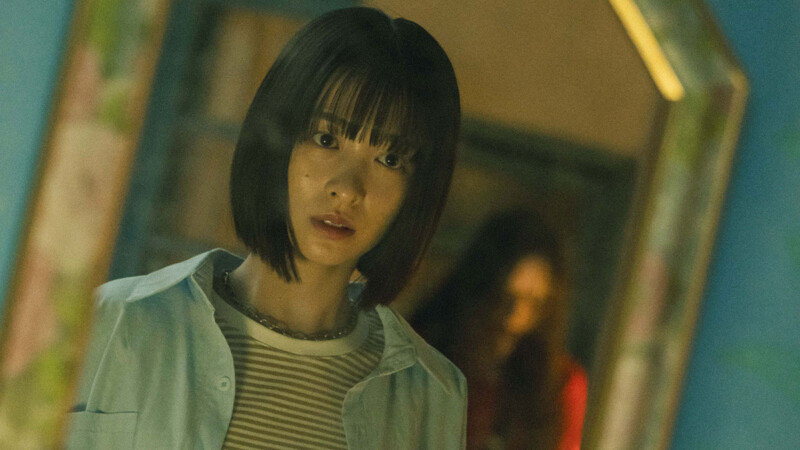Filmmaker Kenichi Ugana’s (We Are Aliens, I Fell in Love with a Z-Grade Director in Brooklyn) new film, The Curse, had its world premiere at this year’s Fantastic Fest in Austin. The horror movie is an entertainingly brutal entry featuring the curse trope, taking satirical aim at the complexity of depicting one’s life on social media, especially from the perspective of those following along with every post.
A Taiwanese-Japanese co-production, The Curse follows salon receptionist Riko (Yukino Kaizu), who notices her friend Shufen’s social media posts have taken an eerie turn, including a photo with the caption, “Drop dead already, all of you.” After being unable to contact Shufen, Riko learns from her ex-boyfriend Jiahao that Shufen died six months prior (“an unnatural death”), leaving them to wonder who has been posting disturbing messages on her account. After Riko’s roommate, Airi, watches one of the cryptic videos “Shufen” has shared, supernatural occurrences plague the friends, leading to more horrifying deaths as their investigation unveils an unhinged revenge plot.
Read below to learn what Ugana shared over email about what inspired The Curse, his views on why the popular trope is prevalent in the horror genre, and how he believes that social media is the “perfect subject to depict the grudges of the modern era.”
The opening scene of The Curse escalates violently as we see a woman running from an unknown entity before she is killed, and then we see the aftermath with her dead body. Was this sequence meant to establish how brutal and relentless the curse is, or to give the audience a taste of what they’re in for?
Kenichi Ugana: Both were necessary for me. I feel that the opening scenes are very important for a horror film.
There are many movies in the horror genre that tackle the curse trope. What do you think it is about curses that makes them an exciting subject to explore in horror?
Ugana: I think it’s because they’re based on human feelings. To me, humans are the scariest thing.
Were there other movies, horror or otherwise, that inspired you as you were writing and filming The Curse? For example, there’s a head-spinning moment in the back half of the film that obviously calls on iconic imagery from The Exorcist.
Ugana: I took inspiration from director Kiyoshi Kurosawa’s worldview. Of course, I was influenced by The Exorcist and various other horror films.
Can you talk about filming the flashback scenes that show how Shufen was suffering from the curse? Those moments, and the reveal on the beach, have a dreamlike (or nightmare-esque) quality. Was that the intention?
Ugana: Yes. I was conscious of making it look like a dream. Most of the characters in this film aren’t very good. However, that family is portrayed as good. I wanted to make it seem like it was just her subjective experience. For that scene, I wrapped plastic wrap over the lens to create a fantastical atmosphere.
Jiahao makes the comment that curses are real in Taiwan and how “many people have died from them.” Was there a specific Taiwanese mythology or folklore that inspired this story?
Ugana: Apparently, in Taiwan, there’s a curse called a paper doll, and Taiwanese ghosts wear red clothes and stick out their long tongues, so I used that as inspiration. In Japan, a curse is commonly performed by nailing dolls made of straw to wood. Japanese ghosts wear white clothes and don’t stick out their tongues, which I found interesting.
Some of my favorite moments in The Curse are when we, the audience, can see the evil entity, but no one else can. Can you talk more about using that storytelling technique?
Ugana: I think the fact that only the audience knows, but the characters don’t, is a very effective film magic, both in terms of the script and the visuals. This time, I was able to use that in both the script and the film.
What was your favorite scene to film?
Ugana: The opening scene is my favorite because it brings together a variety of [elements], including acting, animals, dolls, cars, and music.
At one point, a character says, “I check every single social media post of yours. So I know everything about you.” Social media plays a significant part in the movie and the curse itself. Why was it important to you to tell a story about a curse centered around how someone reacts to the way another person presents their life on social media?
Ugana: Nowadays, many people find their individuality in social media, but I feel like they are unaware of the horror of anyone being able to see their posts, the horror of not knowing what others think of those posts, and the horror of anyone saying something while hiding their face and name. I thought it was the perfect subject to depict the grudges of the modern era.
Following its world premiere at Fantastic Fest, The Curse will also screen at Sitges International Film Festival, Strasbourg European Fantastic Film Festival, Festival du nouveau cinéma de Montréal, Kaohsiung Film Festival, and Nightmares Film Festival. The movie is expected to be released in 2026.

